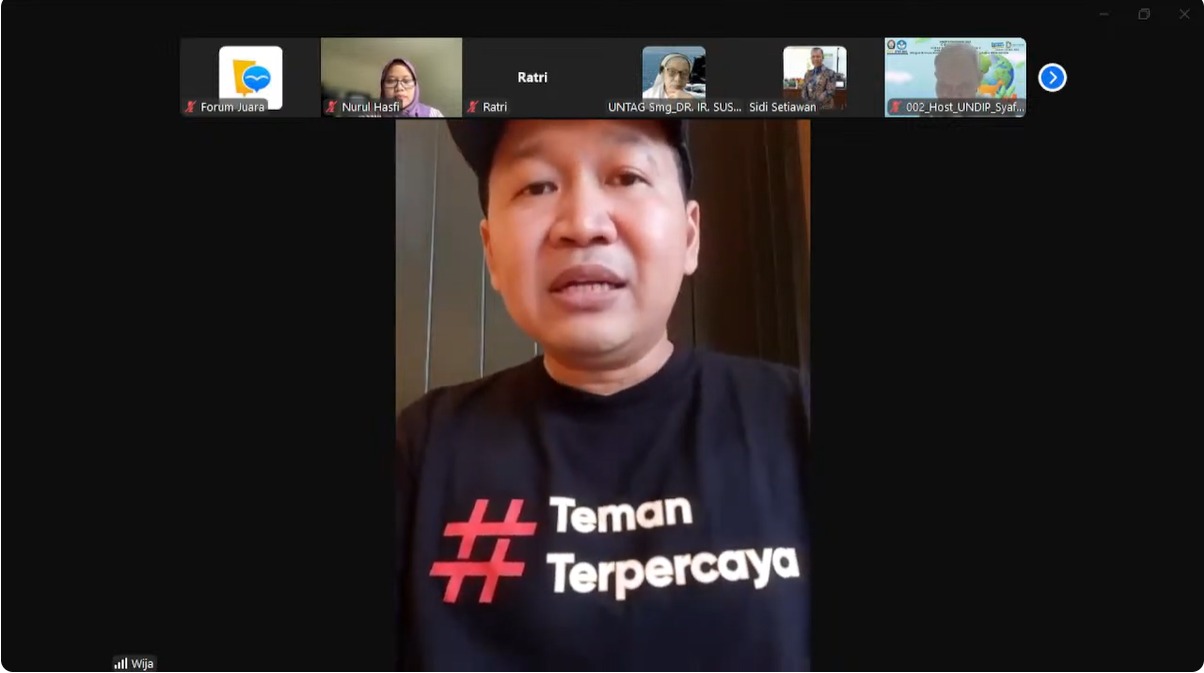Demak Regency has become one of the primary locations for community service initiatives conducted by Universitas Diponegoro (UNDIP). There are four main activities carried out by UNDIP in this context, including: 1) Desalination: transforming brackish water into potable water; 2) Sanitation: providing toilets for people experiencing poverty in the area. The concept is to build raised toilets because the area is frequently impacted by rising sea levels, requiring constant landfilling; 3) Handling stunting issues; 4) Ecotourism: turning the tidal flooding into a blessing through a project that transforms it into a tourist attraction. Apart from Demak Regency, UNDIP’s community service efforts are also carried out in other regencies such as Grobogan, Blora, and Jepara. Moving forward, through collaboration between UNDIP, private sectors, and the government, more regencies/cities in Jawa Tengah will become service locations. This action aims to embody the tagline “UNDIP Bermartabat, UNDIP Bermanfaat” or “UNDIP Dignified, UNDIP Beneficial,” where UNDIP is not only committed to being a world-class research university but also to bringing benefits to the surrounding communities, especially in Central Java, which still ranks second nationally in terms of the number of impoverished residents.
This statement was delivered by the Vice Rector IV of Universitas Diponegoro, Wijayanto, representing the Rector of Diponegoro University, Prof. Suharnomo, during the discussion “Facing the Water Crisis: Challenges and Solutions for Sustainability in Indonesia.” This Juara Forum discussion was held in collaboration with Universitas Diponegoro, Universitas Paramadina, LP3ES, INDEF, and KITLV Leiden via a Zoom meeting on Sunday (29/9/2024).
“This is crucial because, for example, in Blora Regency, the water always contains limestone, which hinders the nutritional intake of the local population. When water mixes with limestone, the nutrients consumed cannot be properly digested,” said Wijayanto.
Wijayanto highlighted that the World Water Forum estimates that by 2025, 1.8 billion people worldwide will face ‘absolute water scarcity,’ meaning they will be unable to meet the minimum annual water requirement of 500 cubic meters per capita. At least 50 percent of the world’s population, or 4 billion people, will experience water shortages for at least one month each year.
Water Crisis in Indonesia
The clean water crisis in Indonesia has long been a complex issue, primarily due to poor water resource management, pollution, groundwater exploitation, deforestation, land-use changes, and the impact of climate change. As of September 2023, according to data from the National Disaster Management Agency, 166,415 residents across 11 provinces in Indonesia were experiencing a clean water crisis due to drought.
Prof. Syafrudin, a Professor from the Faculty of Engineering UNDIP, explained that water is a crucial basic need in all sectors, from upstream to downstream. Unfortunately, the issues being faced are increasing, such as industrial waste, deforestation, and low public awareness of the importance of water resource preservation. He emphasized that water management strategies must include food security, water security, and disaster management. In his view, Indonesia needs stronger policies, as outlined in Presidential Regulation 37/2023 concerning the national water resources policy.
Challenges in Water Management
Meanwhile, Dr. Titik Istikhatun, an Environmental Engineering Academic at UNDIP, highlighted that the threat of a water crisis in Indonesia is becoming more real. The water crisis is due to population growth, limited clean water supply, and poor water and sanitation management. She emphasized the importance of implementing technologies like nanofiltration and reverse osmosis as solutions for clean water supply, especially given the increasing intrusion of seawater into the land, which is further limiting freshwater sources.
On the other hand, Prof. Nyoman Widiasa, a Professor of Engineering at UNDIP, reminded us that although Indonesia has abundant water resources, poor management remains a significant obstacle. The government aims to achieve 100% access to clean drinking water, but so far, this target has yet to be reached. Nyoman suggested better implementation of hydrological cycle technology, where rainwater can be stored and managed optimally. Currently, Prof. Nyoman is leading one of UNDIP’s programs under LPPM to reduce poverty in Central Java by contributing to providing brackish water filtering technology in Sayung, Demak Regency.
The Importance of Community Participation
Prof. Alif K. Sahide from the Forest and Society Research Group stated that the water crisis is not only about availability but also about justice. He explained that water resource management often neglects the role of local communities, which should be an important part of decision-making. Alif referenced Elinor Ostrom’s theory on common goods, where water should be managed as a shared resource involving local communities.
Zaenal Muttaqien, a Researcher at LP3ES, also emphasized the importance of good leadership in water resource management, especially at the regional level. According to him, the disparity in budget allocation between central and regional governments exacerbates the condition of irrigation infrastructure, causing irrigation networks to be damaged despite increased budgets.
Solutions for the Water Crisis
To address the water crisis in Indonesia, synergy between the government, community, and private sector is necessary. A holistic approach encompassing water resource conservation, fair management, and the application of appropriate technology is crucial to ensure water sustainability in the future. Infrastructure development must be accompanied by improving human resource capacity and raising public awareness of the importance of preserving water as an invaluable asset.
